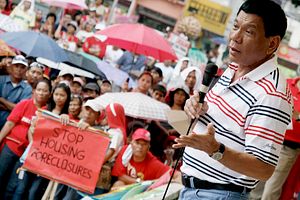Philippine President Rodrigo Duterte’s foreign policy pronouncements have spurred intense interest and debates abroad, but few are commenting about his economic agenda.
Right or wrong, Duterte has chosen to define the first year of his presidency by pursuing his so-called ‘War on Drugs’ and declaring a “separation” from the United States, an old ally and former colonial ruler of the Philippines.
Some analysts are worried that Duterte’s controversial policies and rants could scare away investors and hamper the growth of the local economy. For some critics of the government, there are already disturbing indicators such as the depreciation of the peso’s value and reported losses in the stock market. They believe these troubles could be a negative impact of the government’s misguided priorities.
But last week, the Department of Finance claimed that contrary to expectations, the Philippine economy performed well during the first three months of the Duterte government.
“Amidst uncertainties in the global economy, the Philippine economic growth is the fastest in the region,” said Finance Undersecretary Gil Beltran.
Perhaps the sound economic fundamentals cited by the government are part of the legacy of former President Benigno Aquino III, who finished his term last June.
To be fair to Duterte’s advisers, they didn’t reject Aquino’s economic programs. In fact, the ten-point economic agenda Duterte outlined the policies of the previous administration.
When Duterte’s economic team released this document, many investors were quick to praise the pro-business agenda of the government. They also endorsed Duterte’s proposal to amend the constitution so that it would allow foreign ownership of lands and key industries of the local economy. The removal of ‘protectionist’ provisions in the constitution has been a longstanding demand of foreign investors.
Despite the repeated outbursts by Duterte against the United States government, his economic priorities are seen to be favorable to foreign business, which includes American companies. In fact, the American Chamber of Commerce of the Philippines (AmCham) said it supports the economic thrust of the new president.
“From AmCham’s standpoint, we want this administration to be successful. Can you imagine what a wonderful place this would be if we could get rid of crime, corruption and drugs? It will be an even better investment environment,” said AmCham Executive Director Ebb Hinchliffe. AmCham has more than 700 member companies operating in the Philippines.
It is not just big business groups who are praising Duterte’s economic policies. For example, his order to end labor contractualization was positively acknowledged by various labor groups. The suspension of large-scale mining firms, which are found guilty of violating the country’s environment laws, was also greeted by green groups.
Moreover, the appointment of a Leftist peasant leader in the Cabinet paved the way for the ongoing review of land distribution programs. And finally, the resumption of peace talks with communist rebels is seen by progressive groups as an opportunity to implement nationalist economic reforms under the leadership of Duterte, who repeatedly asserts that he is a socialist.
But for the Ibon Foundation, an independent think-tank, Duterte’s decision to continue the macroeconomic priorities of the previous government is a betrayal of his electoral pledge to bring substantial change in the lives of Filipinos.
“This is certainly the best strategy to increase foreign corporate and oligarch profits but it does not and can never deliver socioeconomic development for the poor majority.”
The group welcomed Duterte’s intention to revive the steel industry, but it questioned the government’s preference to tap foreign capital.
“The government’s industrial policy is, at best, for foreign manufacturers and their subcontractors to set up shop in the Philippines so that the country’s cheap labor and raw materials keep getting exploited by foreign industrial powers,” the group emphasized.
In summary, ‘Dutertenomics’ reaffirms the economic reforms initiated by the Aquino government. The country’s big business groups are generally happy with it, but not Duterte’s leftist allies. Nevertheless, Duterte’s posturing as a nationalist and socialist means there is still opportunity to push for alternative policies that could potentially overhaul the country’s economic profile in the next few years.

































